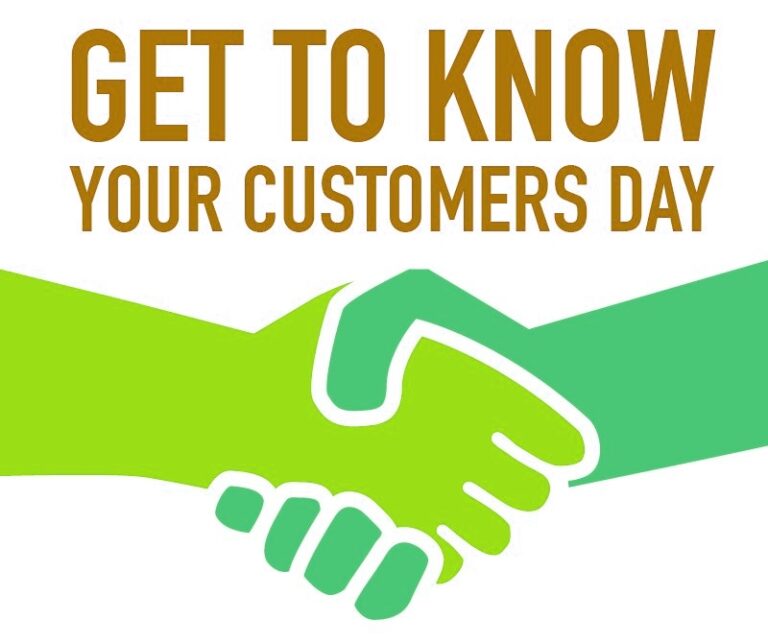
In today’s rapidly changing business environment, understanding your customers has never been more critical. “Get to Know Your Customers Day” serves as a timely reminder for businesses to prioritize customer engagement and deepen their connections with the people who drive their success. As consumer preferences evolve, businesses that focus on building meaningful relationships with their customers will be better positioned to navigate market shifts and foster loyalty.
The Evolution of Customer Engagement
Customer engagement has significantly evolved from the days of direct, face-to-face interactions in local markets and stores. While technology has transformed the way businesses interact with customers—through social media, e-commerce, and mobile apps—the fundamental principle remains: businesses that understand their customers thrive. Technology has expanded the ways in which businesses can collect data and interact with customers, but it also requires a more nuanced approach to maintain the personal touch that builds genuine relationships.
Why Customer Understanding is More Crucial Than Ever
- Personalization Drives Loyalty: In a crowded market, personalization is key to standing out. Research shows that 80% of consumers are more likely to purchase from brands that offer personalized experiences. Understanding your customers’ unique preferences and needs allows businesses to tailor their products, services, and communications, thereby fostering loyalty and encouraging repeat business.
- Navigating the Digital Age: The digital landscape offers vast opportunities for gathering customer insights, but it also poses challenges. While data analytics and AI tools can predict consumer behavior, they cannot replace the value of direct customer interactions. Engaging with customers through feedback and conversations helps businesses gain deeper insights into the emotions and motivations behind their purchasing decisions, beyond what data alone can reveal.
- Building Trust and Transparency: Trust is fundamental to any customer relationship. In an era of increasing concerns about data privacy and ethical business practices, customers are more discerning about which companies they support. By being transparent about how customer data is collected and used, businesses can build trust and differentiate themselves in a competitive market.
- Adapting to Market Changes: The COVID-19 pandemic highlighted the importance of agility in business. Companies that succeeded during this period were those that quickly adapted to new consumer behaviors and needs. By staying attuned to customer feedback and market trends, businesses can swiftly adjust their strategies, whether that means enhancing their digital presence, offering flexible services, or introducing new products.
Strategies for Getting to Know Your Customers Better
- Active Listening: Actively seeking and listening to customer feedback through surveys, reviews, and social media is crucial. This feedback provides valuable insights into customer preferences and pain points. Viewing complaints as opportunities for improvement demonstrates to customers that their voices are heard and valued.
- Leverage Technology: Customer Relationship Management (CRM) systems, data analytics, and AI tools are powerful resources for understanding customer behavior. These technologies help businesses segment their customers, predict future behaviors, and personalize marketing efforts. However, it’s important to use these tools to enhance human interactions, not replace them.
- Engage on Social Media: Social media is a vital platform for engaging with customers in real-time. It allows businesses to have two-way conversations, where they can ask questions, respond to comments, and show appreciation for customer loyalty. Effective use of social media can build a community around your brand and deepen customer relationships.
- Host Customer-Centric Events: Organizing events that focus on customers, whether virtual or in-person, can foster a sense of community and brand loyalty. These events provide opportunities for customers to share their experiences, offer feedback, and feel appreciated. Such engagement helps strengthen the connection between the brand and its customers.
- Continuous Learning and Adaptation: Understanding your customers is an ongoing process. Regularly reviewing customer data, staying updated with market trends, and being willing to adapt are essential for staying relevant and responsive to customer needs. This dynamic approach ensures that businesses can meet evolving customer expectations and maintain a competitive edge.
The Future of Customer Engagement
Looking ahead, the importance of understanding customers will continue to grow. Advances in technology will provide new ways to personalize and enhance customer experiences. However, the core of successful customer engagement remains the same: a commitment to genuinely understanding and valuing the people who support your business.
“Get to Know Your Customers Day” is more than a symbolic date—it’s a call to action for businesses everywhere. It’s a reminder that amidst all the strategies, tools, and technologies, the most valuable asset a company has is a deep understanding of its customers. As we observe this day, let’s recommit to building lasting relationships, fostering loyalty, and driving growth through meaningful customer engagement.
In the words of Peter Drucker, “The aim of marketing is to know and understand the customer so well the product or service fits him and sells itself.” Today, let’s take another step toward that ideal by deepening our commitment to understanding our customers.